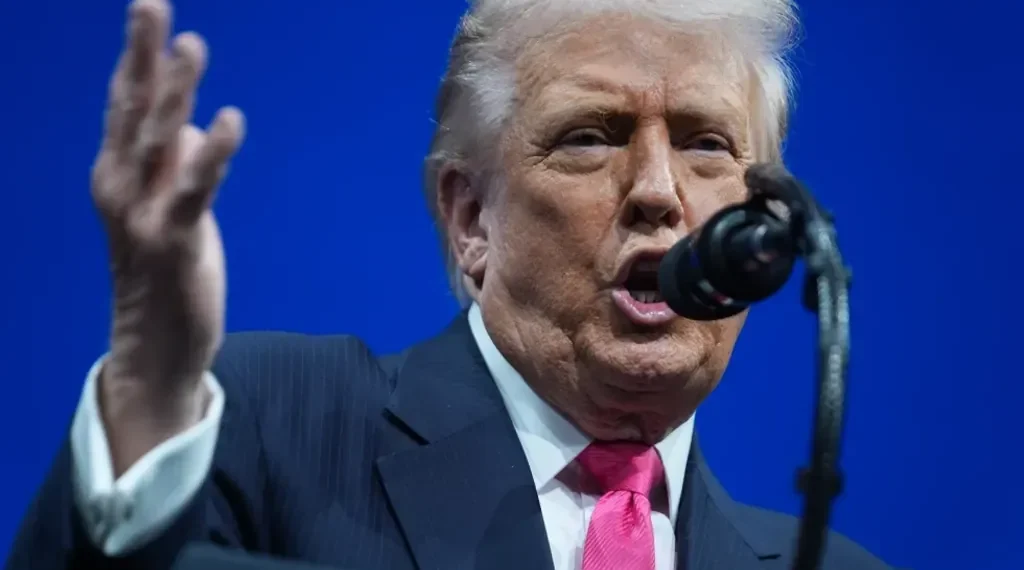Trump Weighs Executive Action to Restrict State AI Regulation
A draft executive order obtained by The Associated Press shows President Donald Trump may push to prevent states from enacting artificial intelligence (AI) regulations. The proposal, supported by some Republicans, aims to unify oversight at the federal level but faces criticism from both parties and civil liberties groups concerned about corporate accountability and consumer protections.
Current State-Level AI Regulations
Four states—Colorado, California, Utah, and Texas—have passed laws addressing aspects of AI in the private sector, according to the International Association of Privacy Professionals.
These measures focus on limiting the collection of personal data and increasing transparency for AI systems used in hiring, lending, housing, and healthcare. Research indicates AI can make biased decisions, sometimes favoring certain genders or races.
Calli Schroeder, director of the AI & Human Rights Program at public interest group EPIC, explained, “With a human, I can ask, ‘How did you reach that conclusion?’ With AI, that transparency is often unavailable, even to its programmers.”
Beyond general rules, states have regulated AI applications in elections, nonconsensual content creation, and government operations. Some proposals also require private companies to assess and mitigate potential discriminatory impacts of AI.
Trump and Republican Objectives
The draft executive order reportedly directs federal agencies to identify state AI regulations deemed burdensome and encourages states to halt them. Methods could include withholding federal funding or legally challenging state laws.
The order also aims to develop a lighter, nationwide regulatory framework that would supersede state-level rules. Trump and supporters argue that inconsistent state regulations create barriers for AI companies and risk allowing China to gain an edge in AI development. The president has also criticized state rules as producing what he terms “Woke AI.”
A senior Trump administration official noted that the draft order is not final and could change before signing, with reports suggesting a possible announcement as early as Friday.
Separately, House Republican leadership is exploring legislation to temporarily block states from regulating AI. Details remain unclear, including which state laws such a proposal would override.
TechNet, a tech industry advocacy group representing companies like Google and Amazon, has argued that pausing state regulations could benefit smaller AI firms and provide time for federal lawmakers to craft a framework balancing innovation and accountability.
Challenges to Federal Preemption of State Laws
Attempts to prevent states from regulating AI at the federal level have faced internal Republican opposition. Florida Governor Ron DeSantis stated a federal ban would be “Not acceptable,” warning it would favor Big Tech and reduce state authority to protect against harmful applications targeting children or censor political speech online.
Cody Venzke, senior policy council at the ACLU, emphasized public concern over unsafe AI. “The American people do not want AI to be discriminatory, unsafe, or hallucinatory,” he said. “Winning the AI race cannot come at the cost of trustworthy systems.”
Federal preemption proposals have historically struggled because they clash with states’ rights to protect residents and maintain consumer safeguards, a tension central to ongoing debates over technology regulation in the U.S.
The Broader Context of AI Regulation
State regulations represent a patchwork approach, reflecting local priorities and concerns over privacy, safety, and fairness. AI increasingly influences daily life, from employment decisions to healthcare recommendations, raising questions about transparency and accountability.
The federal government has yet to establish a comprehensive AI framework, leaving states to act independently. Advocates for a unified approach argue that consistent rules could spur innovation while providing oversight, but opponents caution that overly permissive federal policies may weaken protections for citizens.
Congressional debates and executive actions highlight the complexity of balancing technological progress, national competitiveness, and individual rights. The discussion over AI governance is likely to continue as the technology evolves and its societal impacts become more pronounced.
What Comes Next
The draft executive order and possible congressional measures signal heightened attention to AI governance in the U.S. While proponents frame these actions as necessary to maintain global competitiveness, critics argue that limiting state-level oversight could favor large tech corporations and reduce transparency.
As policymakers, civil rights organizations, and tech industry representatives weigh in, the outcome could set a precedent for how AI is regulated nationwide. The ongoing debate underscores the challenge of creating policies that protect users without stifling innovation.
This article was rewritten by JournosNews.com based on verified reporting from trusted sources. The content has been independently reviewed, fact-checked, and edited for accuracy, neutrality, tone, and global readability in accordance with Google News and AdSense standards.
All opinions, quotes, or statements from contributors, experts, or sourced organizations do not necessarily reflect the views of JournosNews.com. JournosNews.com maintains full editorial independence from any external funders, sponsors, or organizations.
Stay informed with JournosNews.com — your trusted source for verified global reporting and in-depth analysis. Follow us on Google News, BlueSky, and X for real-time updates.














